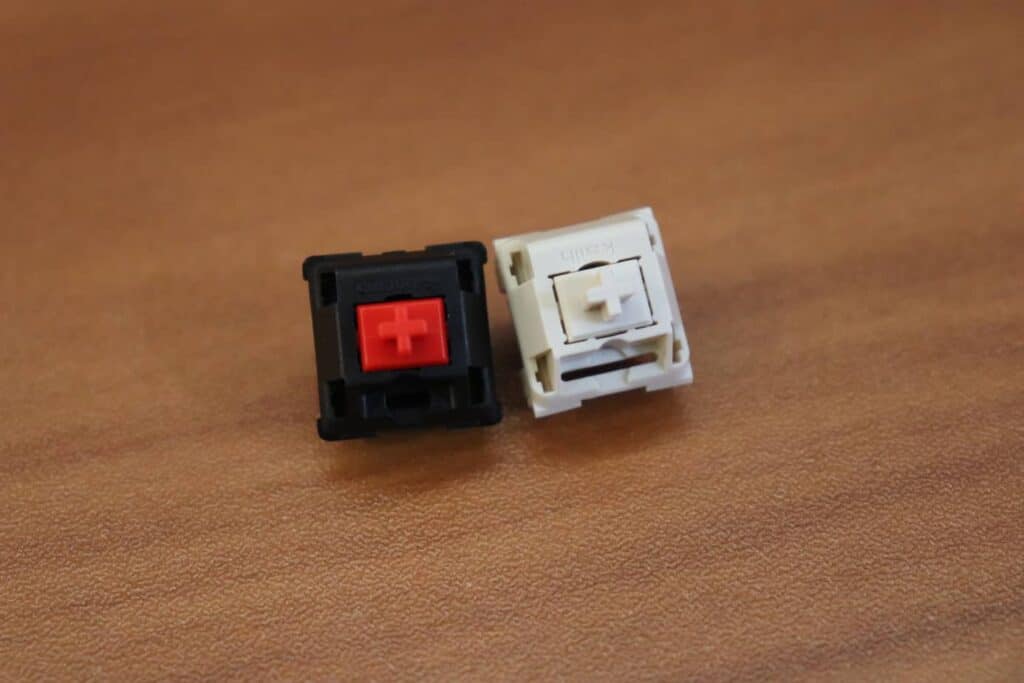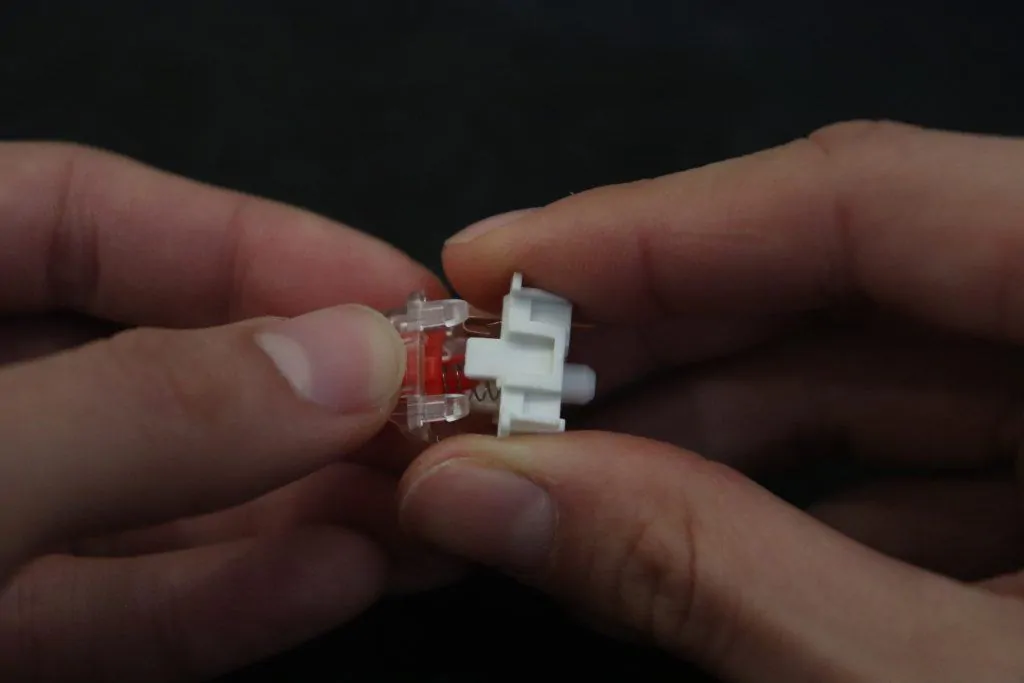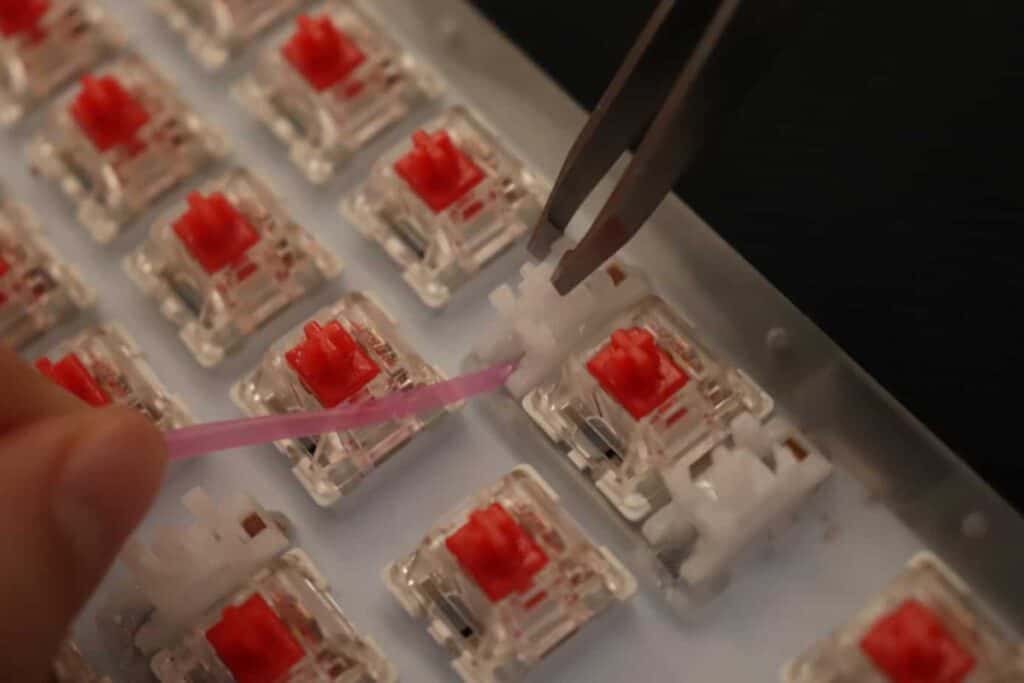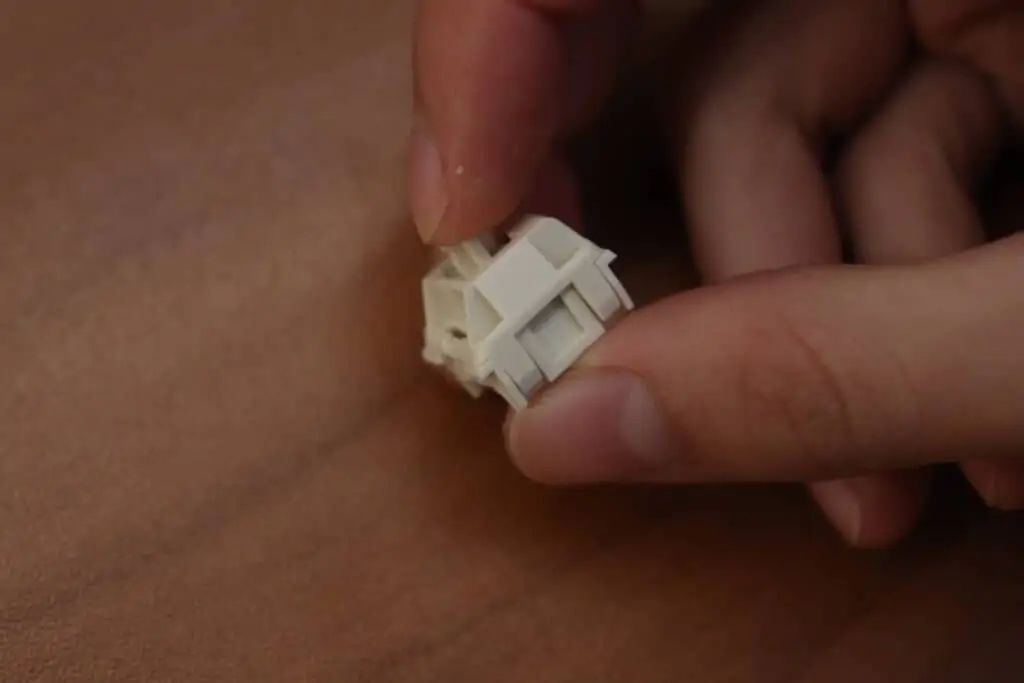You just bought yourself a new mechanical keyboard with smooth linear switches such as Cherry MX Reds or fancier custom switches such as Novelkeys Creams, but you realize as soon as you press them down with your finger that something feels off. It’s possible the newly minted switches feel a bit scratchy, don’t worry because it’s possible to fix the scratchy feeling.
There are two steps to fix scratchy switches:
- Break-in the switch through several weeks of constant use. You’ll most like need to press each switch 10,000 times.
- Apply lubricant to each switch to reduce friction and scratching between the switch components.
We’ll dig deeper into what causes scratchy switches and talk about the recommended methods to break in your switches and lube them.
What Causes Scratchy Switches?

When you first buy a mechanical switch or mechanical keyboard, the switches are virtually unused and have just come straight out of a factory to be sold at stores. All of the switches components are brand new and tightly toleranced, so there is very little room for the parts to move without hitting each other, causing the switches to scratch.
Some brands of mechanical switches start off more scratchy than others. It’s been mentioned many times over and over that Cherry MX switches, especially reds, have a notoriously bad scratch. It’s feels almost as though there is sand between the stem and the switch housing.
Gateron switches tend to have a better reputation because their switch stem is slightly smaller, reducing the amount of friction between the sliders and the housing. This leads to a smoother feeling switch, especially when it comes to linear actuation.
Either way you’ll most likely experience some scratchiness when using a new switch. We’ll go over some different ways to improve your switches and get rid of that scratchy feel.
How to Fix Scratchy Switches
There are two main steps to fix scratchy switches, neither are partly quick or easy solutions, but you should see a big improvement if you follow these recommended steps.
Step #1: Break-in your Switches

Right after purchasing a new mechanical keyboard, the switches will be brand new and at their peak scratchiness. After using the keyboard for several weeks to months, the scratchy sound and feel should slowly start to diminish and the switches will feel smoother.
TopClack recommends at least 10,000 keypresses until a switch is broken in. The time that this takes varies widely and depends on the positioning of the switch on your keyboard as some keys get pressed much more often than others. For example, gamers will most likely break in their WASD keys much faster than their bracket keys.
There are alternative ways of breaking in switches instead of just typing on them. This involves placing them within a plate or acrylic lube station and pressing in them consistently repeatedly day after day.
Another original method that I’ve seen is to use a suspended square fan and have it hit the keyboard switches. Some of these methods are strange, but many mechanical keyboard enthusiasts swear upon breaking in switches. Many people are actually willing to purchase some switches that have already been broken-in by someone else for a premium price. Pretty crazy right?
There are no double-blind randomized studies to confirm that breaking in a switch feels significantly better than not. But from my personal experience, after using switches for a while I tend to like them more. Try your scratchy switches out for a few weeks and see what you think. Then the next step is to lube them.
Step #2: Lube your Switches

Lubing your switches has a host of benefits including reduced scratchiness, less switch ping, better acoustics, and a smoother switch. Lubing can be a pretty long process, so if step #1 improved your switches enough, you can probably skip this step, but it’s up to you.
When you first buy a mechanical keyboard, it is recommended to use the switches for at least a week of consistent use before taking them apart and lubing them. Once you lube the switch, it takes a lot of effect to reverse that effect. This makes breaking in the switches very difficult after they are lubed.
The time varies between switches. People recommend a couple days all the way to half a way of consistent usage via gaming or typing before a switch is broken in a ready to be lubed. We usually recommend a few weeks.
With mechanical switches with a self-lubricating POM plastic housing such as Novelkeys Creams, it is recommended to take advantage of the properties of the plastic by using them for at least 2-4 weeks prior to lubing. This lets the switch remove its friction in a more natural way.
How to Lube Switches
We have a complete pictorial step-by-step guide on how to lube switches, but we will touch over the general steps and materials required here.
First of all, what does lubing switches even mean? This is a process that involves using a lubricant to reduce the friction between the moving plastic parts within a mechanical switch. It can be done via brushing the lube onto the parts, putting the parts in a bag with lube and shaking it, or through alternative methods which we’ll talk about later when desoldering the switch and opening it up is not possible because you do not have soldering equipment.
The materials needed to lube up a switch (if you are able to take all of the switches off of the keyboard) are:
- A switch opener for the switch that you have, either MX style or Kailh style housings
- A small paintbrush
- Lube – see our recommendations for what lube to use here
- A clean working area, a lubing station is recommended to improve productivity but not absolutely necessary
- A plastic bag if you plan on bag-lubing your springs (recommended to also improve productivity)
You will need to open up your individual switches and separate them into their different parts: the stem, spring, top housing, and bottom housing. Be careful not to touch the metal contact leaf within the housing, which is often gold in color.
Using a small brush, you will brush a thin layer of lube onto the parts of the stem and housings where the plastic touches each other during the keypress movement. If you are planning on bag lubing the springs, throw all of the springs in a bag, drop a few drops of a thin lube such as Krytox 105 or 106 or Super Lube 51010 or 51004 in there, and shake it up for 1-2 minutes to evenly coat the springs.
When each part is lubed according to our guide, put the switches back together and place them back into your keyboard. You will feel a significant difference immediately.
Before you decide to lube your entire keyboard, please only lube one switch to see whether you would like the way that it sounds and feels or not. Otherwise, you will end up regretting your actions later on after a 2-3 hour ordeal.
It’s Possible to Lube Switches Without Desoldering
What happens if I have a prebuilt mechanical keyboard, don’t have soldering equipment, and my keyboard isn’t hotswappable? Don’t worry because we got your back.
It is possible to lube switches without desoldering, but we primarily only recommend this method with linear switches. On tactile and clicky switches, due to the inability to control exactly where the lube goes, you risk significantly reducing the tactility of your tactile bumps and also getting rid of the clicky sounds. The results will be inconsistent from switch to switch.
We have our complete guide to lubing switches without desoldering here, but we will go over it on a surface level here.
There are two methods that we have found to be effective with lubing mechanical switches without desoldering.
Method 1 is the push-stem lube method that is more time-consuming and cleaner. This involves taking lube and putting it on a small piece of plastic that you will put into the switch by sneaking the plastic between the stem and the housing. You must do this repeatedly until the switch friction feels consistent.
Benefits of this method is that you do not create a mess, and you also do not need to take the entire keyboard apart. You only need to take the keycaps off.
Method 2 is spray-lubing the switches using an aerosol lubricant such as Super Lube 31110. It is much faster but is quite messy. It involves taking the keyboard apart to reveal the PCB and switches. After that, you take the spray and spray into the corner of the switch while the step is pressed down to get lubricant inside of the switch housing.
This method requires several days to dry. The first few days, you may see that the keyboard switches are not functioning properly. After drying, they will actuate and register again.
Disclaimer: Doing either of these methods will violate the mechanical keyboard warranty and possibly ruin your PCB and/or switches. Do so at your own risk.
Lube your Stabilizers Too!

When fixing scratchy switches, one cannot forget about the bigger keys such as the spacebar, enter, backspace, and shift keys. These keys are special because they also have stabilizers that, well, keep the keycaps from wobbling from side to side when pressed.
It is possible to modify these stabilizers and lube them as well to decrease noise and the friction from pressing down the larger keys. See our complete guide on how to lube stabilizers and how to do it without desoldering as well.
Lubing stabilizers requires a different kind of lube. We have some recommendations in our guide to picking a lube, but in general, dielectric grease or Krytox 205g0 will work perfectly.
By using an interdental brush or a paintbrush if you choose to open the stabilizer up, you can lube the housings of the stabilizer stems as well as the area that the wire occupies to reduce noise within that area.
Other Benefits of Lubing your Switches
Lubing your switches will have an additional positive side effect. It will get rid of the pingy noises inside of the switch caused by the spring sounds. If your keyboard still has some pinging sounds, see our complete guide on how to reduce keyboard spring noise.
We talked about 3 different methods to reduce spring ping, and the best one is to ultimately lube the springs. The other methods require less intensive work, such as adding a desk mat to type on or putting in case foam.
Do Scratchy Switches Get Better Over Time?

Within the mechanical keyboard enthusiast community, there are some switches known as Vintage Cherry Blacks. Vintage Blacks are made pre-1994 and have been used consistently for years, they are considered one of the best switches of all time. They only get better the more they are used. The retooled Cherry Blacks are not quite as good, so the vintage switches can be very difficult to get your hands on.
Some switches with POM plastic housings do get better after a good break-in period such as the Novelkeys Creams. Some switches are smooth in their stock form such as Gateron Ink switches, JWK linear switches such as Durock, Alpacas, H1s, and more. In the end, lubing a switch will almost always be better than another switch in their stock form even if that switch is known to be smoother.
For example, a lubed Gateron yellow will be smoother and feel better than an unlubed Gateron Ink Black. However, it is preferential. Perhaps some people like scratchier switches, and that is completely okay.
Conclusion
To reduce scratchiness in switches, it is possible that the switches may need an initial break in period of 2 weeks – several months depending on the switch and how consistent you use your keyboard. After that, lubing the switch will make the switch feel indefinitely better.
There are some switches that are just smoother in their stock form such as Gateron switches and Durock switches. However, lubing them is still recommended. Even a cheaper budget switch will be better than a more expensive switch if it is lubed properly.
If you follow along with both steps, you should see a significant reduction in the amount of switch scratchiness, and have much better switches all-around.
Go out and lube your switches, people! Happy typing.
